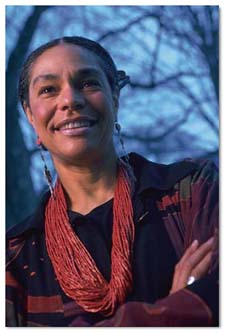
Main Menu ·
Search ·
Current Issue · Contact · Archives · Centennial · Letters to the Editor · FAQs
Profiles
Back to Promoting a National Love of Children
 |
Photograph by David Zadig
|
"Henry Rosovsky and I make a wonderfully odd couple," remarks
Sara Lawrence-Lightfoot about their cochairmanship of the Harvard Project
on Schooling and Children. "We are different in
gender, race, religion, and our way of approaching things, but perhaps that's
why we make a good team."
Lawrence-Lightfoot graduated from Swarthmore College in 1966, attended
the Bank Street College of Education in New York, then earned a doctorate
in the sociology of education from Harvard in 1972. She stayed on at the
School of Education as an assistant professor and became a full professor
in 1980. Her first book, Worlds Apart (1978), dealt with the
relationship between families and schools and the effects of discrimination
in classrooms. "Back then there was almost no literature on children
and families, or on the socialization of children," she says, "nothing
that really showed how kids or their parents negotiated the intersection
between families and schools."
Although she is a sociologist by training, Lawrence-Lightfoot's approach
is essentially that of a portraitist, a methodology that combines art and
science, literary narrative, and empirical description. She uses narrative
to move and persuade, as she once did in testifying about education before
Congress. "I told stories about high schools," she says, "because
I believed I could capture the attention of my listeners by conveying what
was good about those schools." Her 1983 book, The Good High School:
Portraits of Character and Culture, presented six schools from across
the country; it won an Outstanding Book Award from the American Educational
Research Association and earned its author a MacArthur Fellowship. "People
could identify with those stories," she says. "They express details
and subtleties, texture and complexity, from which people extract universals."
"I've tried to be serious, disciplined, systematic, and creative in
my scholarship," says Lawrence-Lightfoot, "and to find ways
to infiuence schools and communities. One of my interests [as cochair
of the task force on the ecology of schooling] is crossing the boundary
between the academy and the schools. How can I find a language that
speaks to people, that will get more of them involved in important public
discourse about schooling and children? We need more narrative about schools
that's local, contextual, that comes out of history, that's about meaning-making
and negotiating one's way. If we could hear the story better, we'd be in
better shape."
Back to Promoting a National Love of Children
Main Menu ·
Search · Current Issue · Contact · Archives · Centennial · Letters to the Editor · FAQs

![]()

![]()